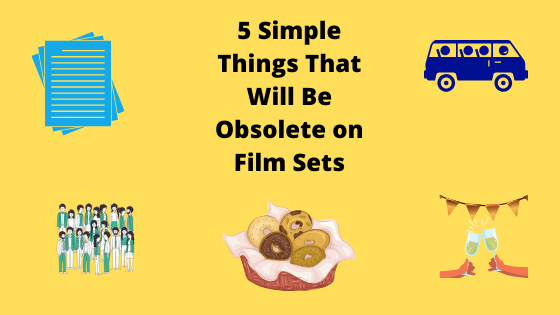5 Simple Things That Will Be Obsolete on Film Sets

Share this
Filming in some places is slowly starting up again after a long hiatus, but working on film sets will not be the same as it was before. The pandemic has changed many common practices within the entertainment industry, both on and off set. Our work practices on set, or even in the production office, will be very different than they were just a few months ago. Some common practices we’ve grown used to when working on set will no longer be in use for the foreseeable future.
Here are 5 simple things that will now be obsolete on film sets:
- Paper call sheets and production reports.
Printed call sheets and production reports have probably been distributed on film sets since the silent film era, and certainly long before computers were around. However, the pandemic has forced productions to minimize the amount of paper that gets passed around on set. Since technology allows the electronic sharing of paperwork, the distribution of call sheets on set is a thing of the past. If you need a paper call sheet, you can print out your own at home so you’ll have it with you on set the next day. The production report can be sent electronically to the production office, no paper required.
- Unsealed food at craft service.
Remember those open trays of bagels and pastries on the craft service table? They’re a relic of the past. Having seen more than one crew member grab food with their dirty hands, even though there were tongs present, I can’t say I’ll miss those open trays. Ditto for the big bowls of fruit that just about everyone on set has touched. Craft service has always been an epicenter of germs on set, not to mention the downfall of many a dieter. Now the craft service table will have to clean up its act, literally. It may actually end up a being simpler system for the craft service people, as they can just put out sealed individual servings of food and have less to clean up. I predict protein bars will now dominate the table. Happy snacking.
- Set visitors.
We’ve all had a friend or family member come to set now and then. Not anymore. Sets will now be high security zones, with no visitors allowed. Every set will officially be a closed set. Of course, there are also no more live audiences for the foreseeable future. In a way it’s a shame, but with less people, there’s less chance of spreading the virus. I think Zoom set tours may just become a thing.
- Crowded shuttle vans.
If you’ve ever been on a crowded shuttle van from base camp to a filming location, you know they provide an ideal environment for disease to spread. The State of Georgia just came out with their list of best practices to prevent the spread of COVID-19 on film sets. Shuttle vans with no more than 2 people, both wearing masks, was a safety recommendation on that list. I imagine that this will encourage finding locations with parking close by, to avoid shuttle travel. Also, only crew members who absolutely need to be on set will go to set. At any rate, crowded shuttle vans will be laid to rest.
- Wrap parties.
Alright, wrap parties aren’t essential to filming and they often don’t even occur anywhere near a film set, but they are now obsolete. It may be silly to even mention wrap parties when shows have been shut down for months, and are struggling to resume production. But wrap parties are a part of life in the industry and they can be enjoyable. Of course, friends or family members often come along, too, which is another reason they’ll disappear. Also, productions will now have to budget for many new health and safety protocols on set. However, if there are Zoom happy hours, I suppose there could be Zoom wrap parties, too. Just BYOB.
So that’s my roundup of 5 simple things that are now obsolete on set. There are undoubtedly many other things that will change that no one has even thought about yet. The interaction with cast and crew has always been one of the things I enjoyed the most about being on set. Unfortunately, that’s the one thing that now must change for productions to be safe.